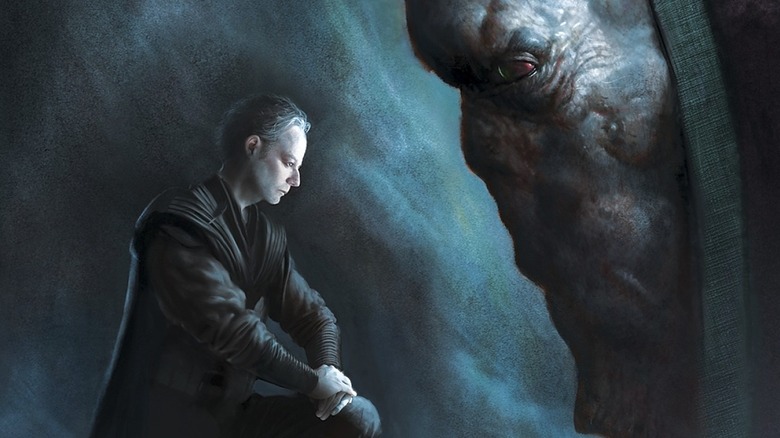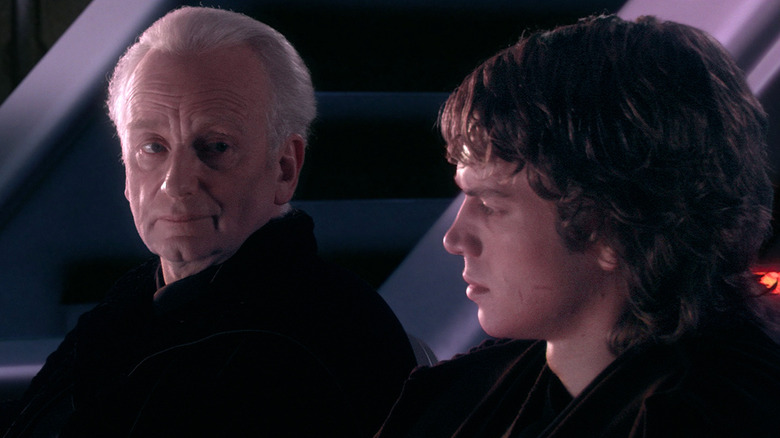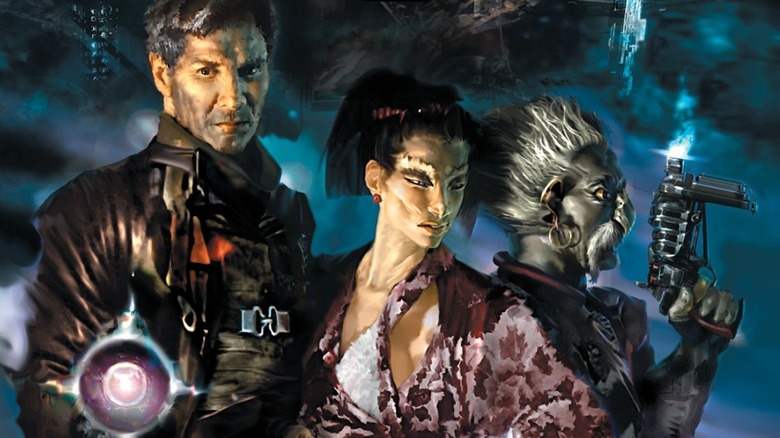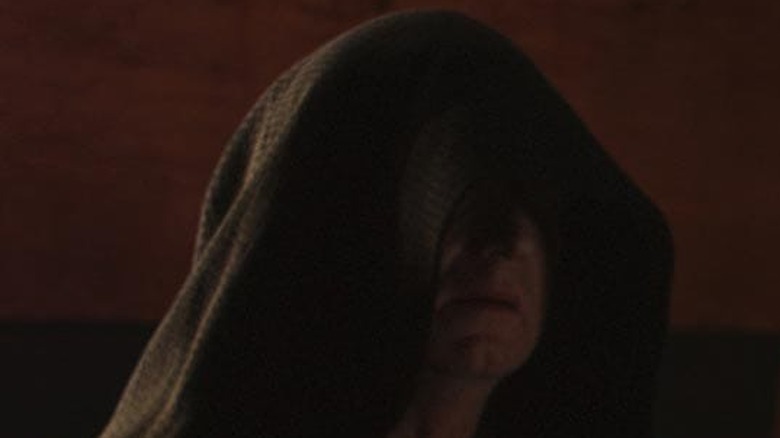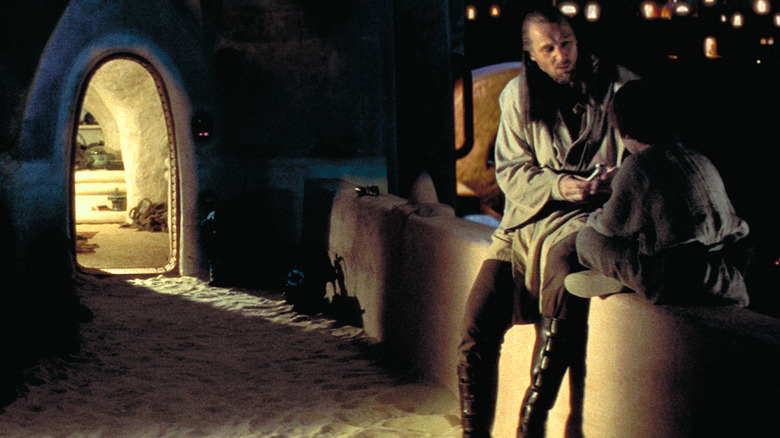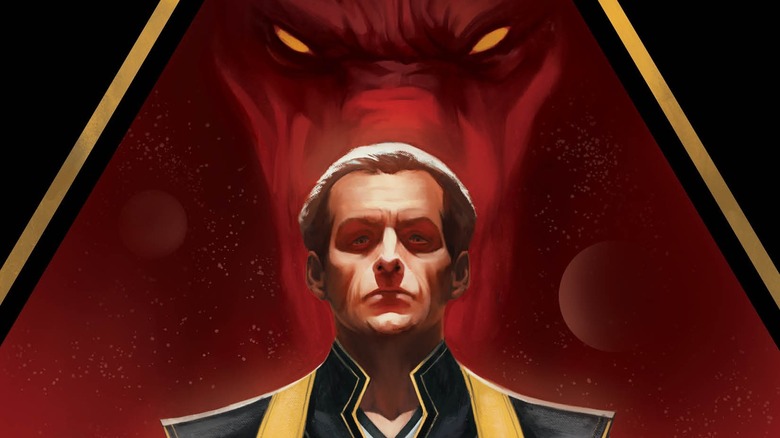Star Wars And James Luceno's Tragedy Of Darth Plagueis The Wise, 10 Years Later
For a great many people, "Star Wars" is a series of movies that are major touchstones in pop culture. For others, it's an ever-expansive universe filled with endless corners to explore, from merchandise to audio dramas, comics, animated TV shows, and, rather importantly, novels. Over the years, fans have been treated to some downright important and excellent storytelling within a galaxy far, far away in the pages of books that have explored everything from what happened after "Return of the Jedi" (the "Heir to the Empire" trilogy and/or the "Aftermath" trilogy) to — and this is true — zombie Stormtroopers (read "Death Troopers").
Not all of the books are canon anymore as Disney hit the big reset button back in 2012 after purchasing Lucasfilm, relegating all of the books from before that acquisition as "Legends" tales. Even with that being the case, one book has always stood a cut above the rest: James Luceno's "Star Wars: Darth Plagueis." Published in January of 2012, it came about at an interesting time, just as Lucasfilm was about to get its biggest shake-up in history and "Star Wars" was about to come back in a massive way. But within its pages, this book contains a wildly important tale within the lore of the franchise that is as compelling, creative, weird, and fascinating as a fan looking beyond the silver screen could hope for.
In honor of the book's tenth anniversary, we're looking back at the novel, how it came to be in the first place, the importance of the story it told, and why the book itself is something of a tragedy, all with insight from the author himself, James Luceno.
The Tragedy of Darth Plagueis The Wise
One very unique thing about "Star Wars," and part of what has allowed it to endure for so long, is that even the smallest things can open up vast, new corners of its gigantic storytelling galaxy. (Example: Boba Fett, a character with only a few lines of dialogue and mere minutes of screen time, became one of the most popular characters in the franchise.) "Star Wars: Darth Plagueis" traces its roots to a particularly interesting scene from 2005's "Revenge of the Sith," the third and final entry in George Lucas' prequel trilogy. At a pivotal moment, Chancellor Palpatine is sitting with Anakin Skywalker at the opera, and the young Jedi is concerned about the fate of his secret wife, Padme Amidala. Sensing the opportunity to strike, Palpatine decides to regale Anakin with a story, and asks him if he has ever heard the "Tragedy of Darth Plagueis the Wise." For those who need a refresher, here's the scene in question:
This is the perfect example of something that does just enough to serve the scene in the movie, yet opens up a whole host of questions that more ravenous franchise fans will want answers to. Who was Plagueis? Why did Palpatine have that knowing smile? Did they know one another? Can the Force really be used to cheat death? This was long before the advent of Disney+, where a "Darth Plagueis" series might have made sense. So, at the time, the most logical place to explore the answers to these great questions was in a novel.
James Luceno, Star Wars Apprentice
James Luceno was 30 years old when he saw the original "Star Wars" back in 1977, and it would be another 23 years before the author would make his debut in the franchise with the 2000 novel "The New Jedi Order: Agents of Chaos I: Hero's Trial." As it turns out, Luceno, much like Palpatine himself before taking over as the head of the Galactic Senate, had been quietly looming in the background, studying and learning from others before his day would come.
"I was thirty when the first film premiered – neither as 'A New Hope' nor Episode IV, but simply as 'Star Wars.' I saw it in a movie theater in Paramus, New Jersey with the late Brian Daley, my close friend and future collaborator, who, along with Alan Dean Foster [author of "Splinter of the Mind's Eye"], would author the earliest 'Star Wars' tie-in novels. I served as a kind of sounding board for Brian during the writing of his 'Han Solo' books, as well as for his scripts for the radio dramas, and so had a strong connection to 'Star Wars' long before being asked to contribute to the franchise."
Though his time wouldn't come until years later, those years of apprenticeship served Luceno well once his number was called. Luceno authored a full "New Jedi Order" trilogy, as well as books such as "Cloak of Deception" and "Labyrinth of Evil," which served as a prequel to "Revenge of the Sith" long before "The Clone Wars" came about to fill in that gap officially. So, how did it come to pass that he would be the one to tell us the Tragedy of Darth Plagueis the Wise? It turns out, this was right in his wheelhouse.
"Most of my contributions to what was once called the expanded universe – to Legends, as it were – involved unpacking obscure references in the films. Reference to the Trade Federation's taxation of the trade routes led to 'Cloak of Deception;' 'that business on Cato Neimoida,' led to 'Labyrinth of Evil.' An email from then-Lucasfilm editor Sue Rostoni that reached me in Guatemala asked: 'Who was Darth Plagueis?' I jumped at the opportunity to find out."
Who Was Darth Plagueis?
While it was crystal clear that Darth Plagueis was a hugely important figure within the dark side of the Force, there was woefully little else to go on. This left Luceno largely to his own devices to backfill this crucial story.
"Lucasfilm was always helpful in providing whatever I needed in the way of background material or answers to questions regarding continuity. I'd been thinking about Plagueis from the moment I had an early look at the script for 'Revenge of the Sith.' Once I had approval to delve into the character, it was George Lucas who suggested that he should be a Muun. I was also instructed not to be explicit about the 'parentage' of Anakin Skywalker."
That last bit is particularly interesting, as fans will surely recall that Anakin doesn't necessarily have a father (that we know of) and was born of the Force. That being said, the events of the novel ultimately crossover with "The Phantom Menace," and Plagueis' quest to achieve true immortality does lay some breadcrumbs, with the Sith at one point talking about the notion of being able to truly create life by using the Force. Later, when Anakin is introduced, these dots are sort of connected — though not explicitly.
Setting that aside, Luceno says the business of figuring out who this tragic character was turned out to be difficult at first.
"Essentially I had nothing to go on but Plagueis' species, and in fact my first outline of the novel was rejected by Lucasfilm for failing to bring out the evil in the character. I was toying with making Plagueis a 3D chess master among other things, and writing him in first person. Months after the rejection, I asked Howard Roffman, then head of Lucasfilm Licensing, if we could revisit the idea, which by then focused on Plagueis as a power behind many scenes, with links to crime syndicates, secret societies, politicians and the rest. Persuaded of my good intentions, Lucasfilm was very generous in allowing me to run with that."
"Without the midi-chlorians, life could not exist"
While, in hindsight, there were some serious implications in that scene from "Revenge of the Sith," it wasn't explicitly stated that Palpatine was Plagueis' apprentice. That was perhaps the biggest decision that Luceno made in crafting the story at the center of the novel that now stands atop the massive heap of "Star Wars" novels as a benchmark for just how good these stories can be. The book pulls a "Romeo & Juliet," kicking off by telling us the ending right up front, with Palpatine ultimately killing his master Plagueis. The book that unfolds shows us how this compelling tragedy came to be.
"Everyone who had watched 'Revenge of the Sith' already knew what happened; the events came straight from the lips of Palpatine to Anakin – at least from a certain point of view. So my idea was simply to get that part of the story over with and jump back in time to events that set in motion what was to come – a common enough technique for bringing things full circle, which seemed appropriate for the narrative."
The meat of the story kicks off with Plagueis surpassing the teachings of his master, killing Darth Tenebrous. This sets into motion the tragedy that unfolds, as Plagueis becomes obsessed with the notion of conquering that fate, which has been something the Sith have had to contend with ever since the Rule of Two was put into place: Only ever a master and an apprentice. No more. No less. Yet, the obsessive pursuit to cheat death and achieve immortality, crafting a Sith rule that could last generations, also led to hubris which became Plagueis' downfall, leading him to find himself in the same place Tenebrous found himself: dead at the hands of his apprentice. One thing that "Star Wars" storytelling is very good at is weaving in the notion that history repeats itself, and that thread is very present in this book.
With that as the center of the narrative, the task of crafting a young Palpatine was entrusted to Luceno. This was no small thing, since — especially after the release of the prequels — the character was just about as important as anyone else within the series, and we were about to learn a whole lot more about him. Again, the author's previous experience made him an ideal candidate to tell this part of the story.
"My previous dive into the nature of the Sith in 'Dark Lord,' in which Anakin transformed into Darth Vader, was crucial to my thinking about Palpatine, and the burden of being born to the dark side. I had already amassed plenty of information about Naboo when writing about Darth Maul's exploits on that planet, so I simply needed to drop Palpatine into the midst of all that, and furnish him with an incident that would ultimately drive him over the edge and into Plagueis's grip."
That incident involved manipulation on Plagueis' part after he sensed something in Palpatine, setting forth a series of events that led to Palpatine killing his own parents, leaving him with nowhere left to turn but Plagueis and setting him on an irreversible path to the dark side that shaped the galaxy as fans came to know it.
But the big question at the center of "The Tragedy of Darth Plagueis the Wise" has to do with cheating death. This idea sets Anakin on the path to becoming Darth Vader which, in the end, proves to be Palpatine's undoing. It's hugely important. Luceno took a pretty interesting approach to this aspect, opting to use midi-chlorians as the crux of the whole thing. The controversial element of "Star Wars" was introduced in "The Phantom Menace" as a means to measure one's strength in the Force, with those who have a high midi-chlorian count being more attuned to the Force. Lots of fans outright hated this inclusion by Lucas, which makes it all the more fascinating that Luceno leans into it hard in this novel, with Plagueis obsessed with the idea of manipulating the microscopic lifeforms to do his bidding and, ultimately, achieve immortality. Yet, Luceno manages to make it work, and it all comes down to his approach and reasoning.
"Midi-chlorians provided me with a means of grounding Plagueis' search to obtain mastery over life and death – as those terms apply to both the light and dark sides of the Force. I didn't want to rely on magic or psychic ability, so opted for an approach closer to 'Frankenstein' than, say, 'Doctor Strange.'"
A Legacy Told Only In Legends
Ten years removed, "Star Wars: Darth Plagueis" is still widely considered to be one of the greatest novels ever published within the franchise. And yet, because Disney reset the canon after taking over, the novel has been relegated to "Legends" status, meaning its account of the events is not considered to be the definitive account. Disney could completely re-tell the tale in another way at some point, or they could never address it again. It remains nebulous and, in that way, frustrating.
There is no question that the "Star Wars" expanded universe as it used to exist was messy and unruly. In 1999, Chewbacca died by getting crushed by a moon. I get it. Disney had to do something and, in some ways, they made the only decision they could. Luckily, they have incorporated elements of these "Legends" tales into the new canon, with Grand Admiral Thrawn appearing in "Star Wars Rebels" before making his way to a new series of novels written by the character's creator, Timothy Zahn. But to this point, nearly ten years removed from the sale of Lucasfilm to Disney, the studio has brought elements of these tales into the canon, but nothing wholesale. And therein lies the true tragedy.
In my eyes (and surely in the eyes of many other readers), Luceno's account of "The Tragedy of Darth Plagueis the Wise" would be incredibly difficult to improve upon. It is operatic and filled with subtle history lessons on the Sith while staying on target and focusing on the story at hand, even when bringing in familiar elements from other corners of the "Star Wars" galaxy. It always serves the story and is never distracting. It even manages to improve one's view of "The Phantom Menace" in the third act, adding a ton of additional context to those events, including the formation of the Clone Army, Dooku's path to becoming a Sith, and even Maul's apprenticeship to Palpatine.
"Star Wars: Darth Plagueis" is a bold, important, and essential story within the franchise. It's a story that needs to be addressed at some point within the new canon — no two ways about it. Yet, Luceno already told this tale in pitch-perfect fashion. To bring balance to the Force, as it were, Disney would do well to designate this novel as canon and do away with the idea of improving upon what is already there. Madness that way lies. To date, nothing in the established canon truly contradicts this novel, and there is no reason it can't be set in stone as the definitive version of these key events.
Whether or not that happens remains to be seen, but ten years removed, this remains a seminal "Star Wars" tale — even if it is, at least for now, only from a certain point of view.
